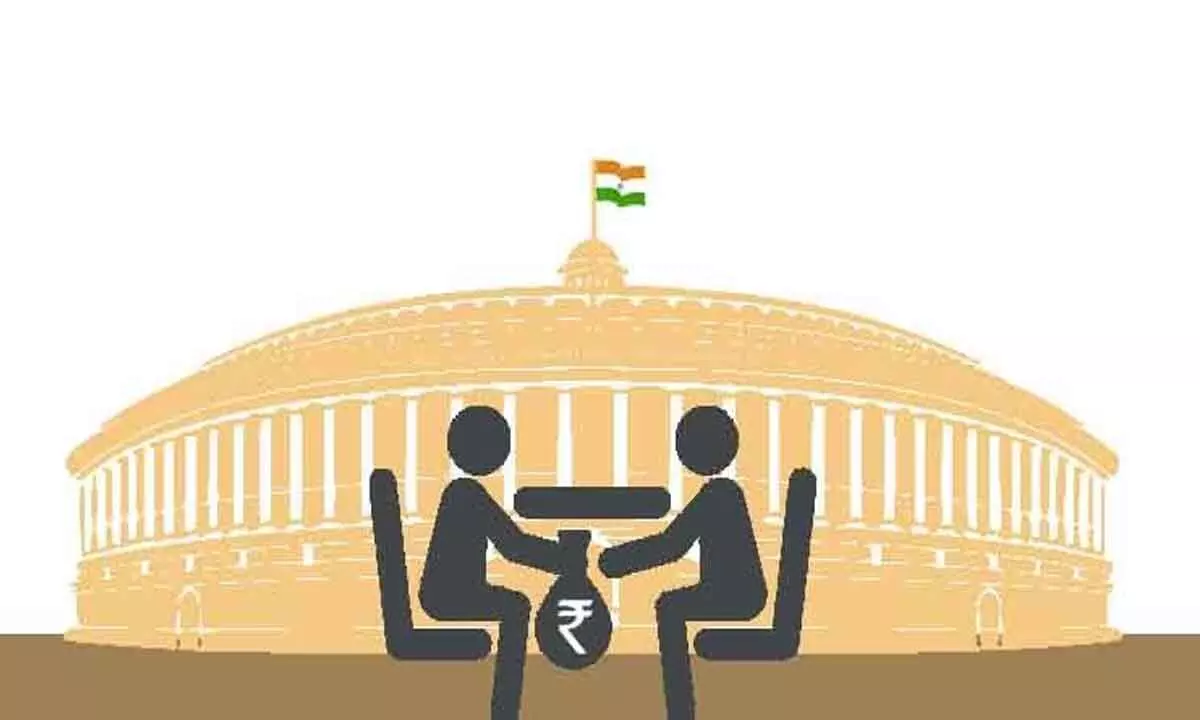Parliamentary immunity vs. anti-corruption laws: India at legal crossroads
The Mahua Moitra case is a classic example of the manipulation of a constitutional privilege
image for illustrative purpose

If the Supreme Court chooses to amend the 1998 judgment, we may witness a more robust interpretation of anti-corruption laws, aligning Indian standards with global ethical practices. This, in turn, could herald an end to constitutionally sanctioned bribery and bring greater integrity to the political process.
However, the path ahead is fraught with challenges. The Supreme Court must decide whether the votes cast during Rajya Sabha elections are considered part of House proceedings, and, therefore, protected by Article 194(2)
In the midst of a legal tug-of-war over parliamentary immunity in India, recent events have once again highlighted the issue's glaring complexities. At the heart of the debate is Article 105(2) of the Indian Constitution, which grants parliamentarians protection from criminal prosecution for their parliamentary duties, including voting and raising questions. While this safeguard was originally designed to ensure unbridled freedom of speech and expression within the parliamentary sphere, it has been exploited to a concerning degree, as evident in the recent case involving Trinamool Congress MP MahuaMoitra.
Here, we delve into the legal intricacies of Articles 105(2) and 194(2) and the unsettling abuse of parliamentary immunity by individuals like Moitra, who evade justice due to the letter of the law.
Shield of immunity: Articles 105(2) and 194(2)Article 105(2) of the Indian Constitution stands as a pillar of parliamentary privilege, providing Members of Parliament (MPs) with a seemingly impenetrable shield from prosecution. This clause ensures that the privilege to an MP's vote or speech in Parliament translates into absolute freedom of speech and expression, subject only to the rules mandated by the House. Its very essence is rooted in the idea that within the hallowed halls of the Parliament, MPs should be able to express themselves without the looming specter of legal consequences.Parallel to Article 105(2), Article 194(2) grants the same privilege to state legislators, reinforcing the principle of absolute parliamentary immunity.
Moitra and unsettling misuse of immunity:The case of MahuaMoitra serves as a stark illustration of the misuse and manipulation of this constitutional privilege. Even if Moitra were to have accepted a bribe, the law as it stands today would shield her from criminal prosecution, thanks to the protection bestowed upon all parliamentarians under Article 105(2).
This unfortunate scenario arises from the literal interpretation of the law. In practice, MPs can accept bribes to influence votes or questions within Parliament without facing the prospect of being held accountable in a court of law. This glaring misuse of immunity showcases how a well-intentioned safeguard has strayed far from its original purpose. It has created a gaping loophole, allowing unethical practices to thrive under the guise of constitutional protection.
It's worth noting thatMoitra's case highlights the broader issue of ethics and accountability in the political arena. While her actions is viewed as unethical by many, the existing legal framework ensures that she will not be punished. This is the paradox of parliamentary immunity—protecting free speech within the Parliament but inadvertently shielding corruption.
Rethinking the future-SC's crucial role:In light of this unsettling misuse of constitutional immunity, the Supreme Court's decision to revisit the 1998 judgment in PV Narasimha Rao vs State takes on even greater significance. A seven-judge bench, led by Chief Justice of India D.Y.Chandrachud, has shown keen interest in reevaluating the judgment, signaling the possibility of a more just and accountable future.
This ongoing reexamination offers a glimmer of hope for a cleaner political landscape. If the Supreme Court chooses to amend the 1998 judgment, we may witness a more robust interpretation of anti-corruption laws, aligning Indian standards with global ethical practices. This, in turn, could herald an end to constitutionally sanctioned bribery and bring greater integrity to the political process.
However, the path ahead is fraught with challenges. The Supreme Court must decide whether the votes cast during Rajya Sabha elections are considered part of House proceedings, and, therefore, protected by Article 194(2). If it rules in favor of such inclusion, the modified judgment could adopt a more stringent stance on bribery, making it less likely that immunity would be granted to legislators in such cases.
In conclusion, the revisitation of the constitutional immunity debate underscores the pressing need for change in the face of misused legal safeguards. The Supreme Court's role in this ongoing saga holds the potential to redefine the boundaries of immunity and bolster the fight against corruption. While MahuaMoitra can be called out be unethical, the legal framework remains a barrier to her accountability. The nation looks to the judiciary to strike a balance between free speech and ethical governance and usher in a more accountable political landscape.
(The writer is a Public Policy Consultant. He writes on topics in institutional economics. Views are personal)

